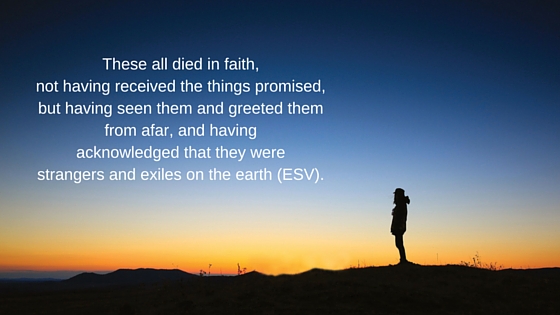The exile is a central concept in the Old Testament. We can see this in the Primary Narrative from Genesis through 2 Kings, which ends with the exile of Judah to Babylon. Each of the three sections of the Hebrew Bible (Law, Prophets, and Writings) ends with exile: Moses is exiled from entering the Promised Land at the end of Deuteronomy; the book of Malachi prophesies the promised return from exile; and 2 Chronicles ends with a call for the exiles to return to Jerusalem. When the Old Testament canon came to a close, the faithful Jews reading it in exile were instructed to wait for the coming of the promised Messiah. The Old Testament consistently speaks to a people who were strangers and exiles on the earth.
The New Testament begins by describing the birth of Christ with reference to the deportation to Babylon (Matt. 1:17), acknowledging exile as the contextual background to the New Testament. There are three places where the Greek word for exile (παρεπίδημος parepídēmos) is used — 1 Peter 1:1, 1 Peter 2:11, and Hebrews 11:13. The book of 1 Peter was addressed to Gentile and Jewish Christians, providing an opportunity for us to think more broadly about exile and the Church as a whole. However, here we will focus briefly on Hebrews 11:8–16, addressed primarily to Jewish Christians, and look at how the life of Abraham, the model of Christian faith, instructs us about the Church as an exilic community.
Hebrews 11, the so-called “hall of faith,” flows out of the end of chapter 10, where the author affirms that he and his readers are the righteous ones living by faith. Hebrews 11 begins and ends with the idea that faith, along with hope, are cardinal Christian virtues in the interim period between promise and fulfillment.
The character that receives the most attention in the chapter is Abraham (vv. 8–20, over 30%). Abraham was called to go to a place he would receive as an inheritance (v.8) and to live as an alien in the land of promise (v.9), while looking for a future city from God (v. 10, 14–16). While the Lord fulfilled his promise to Sarah that she would bear a son, Isaac was only a kind of first fruits of the greater promise that Abraham’s seed would be like the stars of the heaven (v. 11–12). Even after Abraham offered up Isaac, he received him back “in a parable,” as it were — again as a kind of down payment of the resurrection.
Such a life of faith is summarized in Hebrews 11:13: “These all died in faith, not having received the things promised, but having seen them and greeted them from afar, and having acknowledged that they were strangers and exiles on the earth” (ESV).
Thus, Abraham, as a model for the community of faith, is led on a journey of faith and obedience as a stranger and exile on the earth. Abraham and his seed dwell as outsiders and aliens, looking forward to a city whose architect is God, and as heirs of the promise.
Abraham and his seed dwell as outsiders and aliens,
looking forward to a city whose architect is God, and as heirs of the promise.
We today, still strangers and exiles, are called to that same life of faith.
Genesis 23 provides an excellent illustration of this. After Sarah’s death, Abraham seeks to purchase a burial plot from the sons of Heth. In 23:4, Abraham acknowledges, “I am a stranger and an exile [LXX παρεπίδημος parepídēmos] among you; give me a ‘holding’ among you for a burying place, that I may bury my dead out of my sight.”
This action by Abraham illustrates that as an exile, he must live in accord with the prevailing laws, customs, and business dealings of the sons of Heth. At the same time, his faith in the promise dictates that he bury Sarah in his homeland, the land of promise. Abraham and Joseph were also buried there as a testimony of faith in the promise of God (49:30, 50:13).
Our story as Christians, and the corporate story of the Church, parallels the life of Abraham. The early church was born in subjection to imperial government, the laws and judicial renderings of the courts, and an economic system in which many suffered due to their faith in Christ. At the same time, they preached the gospel of the kingdom of God, living lives of faith, hope, and love — and, over time, the gospel prevailed, changing the whole world. We today, still exiles and strangers, are called to that same life of faith.
Dr. Brian Toews is the University provost. He has been on Cairn’s faculty since 1993. He can be reached by emailing provost@cairn.edu.
